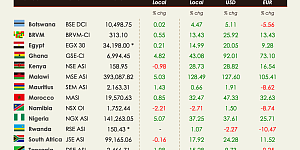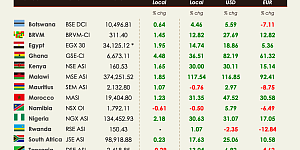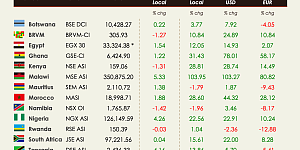The first week of October started in a positive fashion with 10 out of the 17 indices under coverage evolving in green territories. The Egyptian index was the outlier marking the strongest performance this week.
The EGX 30 jumped 6.18% as news came that Egypt is close to get IMF loan approval and could get the first tranche of $2.5bn very soon. This news was enough to offset the contrarian move taken by the Central Bank of Egypt (CBE). Indeed the bank decided to launch a regular auction selling $117.9 mn to banks and fixed the price of the US dollar to EGP 8.78. This surprised the market which was expecting the CBE to float the Egyptian currency or reduce its value against the US dollar. In parallel, a sugar crisis is taking place in Egypt as supply is not meeting market demand anymore in the country. It seems that the imbalance intensified once soft drink companies started to buy sugar from the local market instead of importing it due to shortage in US dollars while the market was already suffering from a drop in local production. As a result, the Egyptian Ministry of Supply and Internal Trade reported it would provide 420,000 tonnes of sugar to meet the market’s demand.
The DSE ASI lost 0.41%. Tanzania’s Finance Minister reaffirmed that the country’s economy would grow 7.2% this year thanks to sustained government spending which helps inhibiting the effect of the commodity retreat. The public spending especially targets infrastructure projects including building roads and power plants. The government expects growth to reach 7.4% next year which is in line with consensus forecasts.
In Nigeria the dollar shortage is still suffocating the economy prompting the naira to break records in the country’s bureaux de change. The liquidity issue is putting pressure on the currency forcing it to depreciate heavily. In the meantime, the Ministry of Budget sees the country’s GDP expanding this year thanks to a good harvest of rice this year. This expectation differs from the IMF’s view that the economy will decrease by 1.7% this year and comes after IMF reduced its expectations of Nigerian 2017 economic outlook to 0.8%. Nigeria has been suffering from the plunge in oil prices cutting the nation from an important source of revenue. Now will the increase in rice production be sufficient to drive growth is a key question. The NGSE ASI lost 1.77%.
Food price inflation rose 11.6% in August in South Africa partly due to the heavy drought the country is undergoing which has affected its crops and livestock. South Africa is Africa’s leading corn producer and has now become a net importer. The issue may continue into 2017 as lack of rain and supra-normal heat are expected to carry on. The JSE ASI lost 0.55%.
Access Bank is thinking about selling 19% of its stake in its Ghanaian business unit in an IPO. Access is looking to raise at least 104 million cedis ($26 million) in order to boost its capital. GSE-CI lost 0.39%.










































